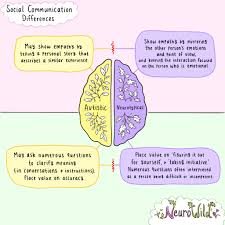Hello,
There are people on here and on other websites that talk about ''the autistic communication style'' and the ''non-autistic communication style.'' It largely talks about how most communication issues occur between autistics and non-autistics are because the communication styles are fundamentally so different.
I have been trying to research what these communication styles are.
I'm not sure which one I most closely fit to.
I think how I am communicating is understandable by others, only for those people to tell me what I said doesn't reflect how they interpretated what I was saying.
It is fustrating being 25 and not knowing my own ''way of being.''
Please may someone provide me with more information on autistic communication styles and non-autistic communication styles so I can better work out where I fit?
Thank-you.




